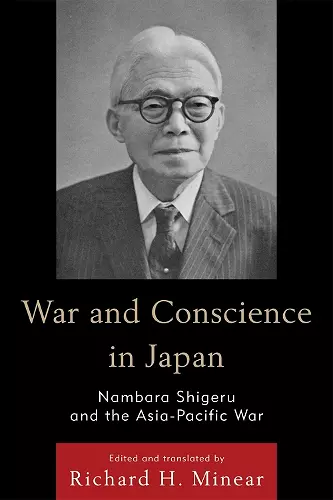War and Conscience in Japan
Nambara Shigeru and the Asia-Pacific War
Nambara Shigeru author Richard H Minear editor
Format:Hardback
Publisher:Bloomsbury Publishing PLC
Published:16th Dec '10
Currently unavailable, and unfortunately no date known when it will be back

One of Japan's most important intellectuals, Nambara Shigeru defended Tokyo Imperial University against its rightist critics and opposed Japan's war. His poetic diary (1936–1945), published only after the war, documents his profound disaffection. In 1945 Nambara became president of Tokyo University and was an eloquent and ardent spokesman for academic freedom. Among his most impressive speeches are two memorials to fallen student-soldiers, which directly confront Nambara's wartime dilemma: what and how to advise students called up to fight a war he did not believe in. In this first English-language collection of his key work, historian and translator Richard H. Minear introduces Nambara's career and thinking before presenting translations of the most important of Nambara's essays, poems, and speeches. A courageous but lonely voice of conscience, Nambara is one of the few mid-century Japanese to whom we can turn for inspiration during that dark period in world history.
Provide[s] a unique lens through which readers can view Nambara’s intellectual resistance to the totalitarian state and his anguish over the war. The introduction offers . . . rich historical context for the selected works before, during and after World War II. . . . The editor’s diligence and talent has produced a set of primary sources in English for understanding Nambara Shigeru's political thought and conveying the genuine and nuanced voice of an intellectual in wartime Japan. It is a valuable book and should serve as a reference for researchers who are interested in the intellectual and political history of modern Japan. . . . Nambara’s poems in Japanese and Minear’s lucid and elegant translations will be welcomed by students of Japanese literature. * Journal of Asian Studies *
Among all that is valuable in this welcome volume, it is a special delight to have the generous selection from Nambara's poetic diary, which allows us to follow Nambara's intellectual and emotional struggles during the war almost day by day. Minear makes available to us Nambara's example of thoughtful patriotism at a time when we ourselves need such models most. -- Andrew Barshay, University of California, Berkeley
Minear gives English-language readers access for the first time to key writings by one of twentieth-century Japan's most important public intellectuals. These careful, lucid translations of Nambara's dissident poetic diary from the years 1936–1945 and of his famously inspirational wartime and postwar speeches bring us one man's struggle to serve both nation and conscience in tumultuous times. -- Kim Brandt, Columbia University
Minear combines two scholarly interests: the intellectuals in the Imperial universities, whom he first studied in his Japanese Tradition and Western Law (1970), and the Pacific War, which he first examined in Victor's Justice: The Tokyo War Crimes Trial (1971). With an enviable fluency in translating both the jargon of the professors and the tanka poetic form, he has given us another nuanced perspective on Japanese history. -- Byron K. Marshall, University of Minnesota
ISBN: 9780742568136
Dimensions: 238mm x 163mm x 21mm
Weight: 463g
230 pages